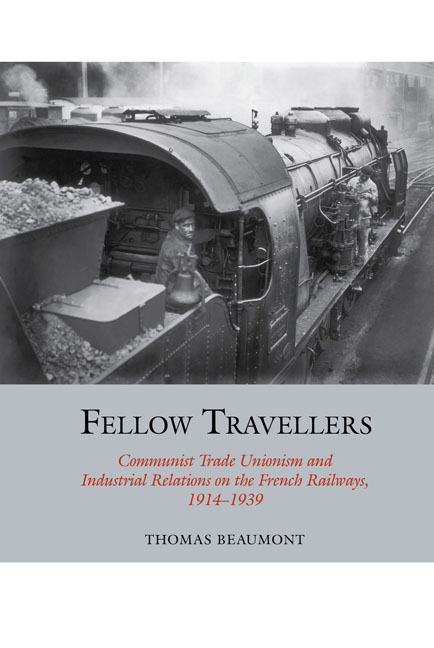 Fellow Travellers
Fellow Travellers Book contents
- Frontmatter
- Contents
- Acknowledgements
- Introduction
- 1 Railway Workers at War
- 2 Railway Workers and the ‘Après Guerre’
- 3 Railway Workers and the Communist Choice
- 4 Stabilisation
- 5 International Connections
- 6 ‘Hostile Participants’: Communists and Railway Industrial
- 7 Railway Workers and the Popular Front: From Victory to Defeat, 1934–1939
- Conclusion
- Bibliography
- Index
5 - International Connections
- Frontmatter
- Contents
- Acknowledgements
- Introduction
- 1 Railway Workers at War
- 2 Railway Workers and the ‘Après Guerre’
- 3 Railway Workers and the Communist Choice
- 4 Stabilisation
- 5 International Connections
- 6 ‘Hostile Participants’: Communists and Railway Industrial
- 7 Railway Workers and the Popular Front: From Victory to Defeat, 1934–1939
- Conclusion
- Bibliography
- Index
Summary
Cheminot internationalism during the 1920s proved to be highly problematic for those who still looked to the railway workers as a source of political militancy within the French working-class movement. While on the one hand railway workers enjoyed a reputation for their international links and the sense of a global railway community, on the other hand the political and social climate of the 1920s in reality often worked against such international solidarities, placing cheminots at odds with workers internationally, and with the leadership of the PCF. This was most notably the case during the Ruhr occupation during which some 20,000 French and Belgian railway workers operated as strike breakers during the German workers’ campaign of passive resistance. In this, as in the communist campaign against the Rif War, the legacies of the 1920 defeat were still in evidence, casting a shadow across the cheminot community. Nevertheless, in their day-to-day working environment numerous workers demonstrated their commitment to the internationalist cause, and nurtured communist political campaigns, often against the odds.
Cheminot Internationalism
From the earliest days of modern train travel, the railways have always occupied a complex political space; deeply entwined with the nation state they were also from the outset profoundly international endeavours. While the relationship between individual nation states and the railway industry developed in differing fashions through the nineteenth century, from the wholly private financing of British laissez-faire liberalism on one extreme to the fully state-owned Belgian system on the other, the railways quickly became enmeshed with ideas of nationhood and discourses of national prestige. Yet, the railways were also a major global industry. Alongside the global spread of the railways emerged an international labour force of engineering experts, highly skilled locomotive footplatemen and railway navvies, a cosmopolitan, mobile workforce which proved crucial to the industry's development. International connections and cooperation continued to be vital to the industry throughout the nineteenth and twentieth centuries. French railway companies maintained close links with foreign railway operators. This was particularly marked in the borderlands, of course, where trains crossed back and forth between national jurisdictions. In the north of the country, the Compagnie du Nord sustained important connections with the Belgian railway network, for instance.
- Type
- Chapter
- Information
- Fellow TravellersCommunist Trade Unionism and Industrial Relations on the French Railways, 1914–1939, pp. 137 - 160Publisher: Liverpool University PressPrint publication year: 2019


